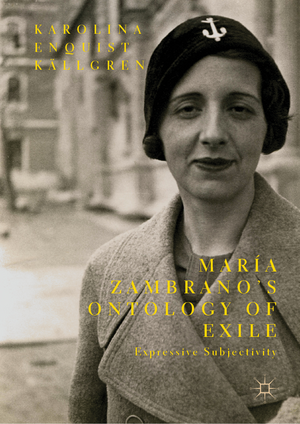María Zambrano’s Ontology of Exile: Expressive Subjectivity
Autor Karolina Enquist Källgrenen Limba Engleză Hardback – 8 apr 2019
Preț: 498.61 lei
Preț vechi: 586.60 lei
-15% Nou
Puncte Express: 748
Preț estimativ în valută:
95.40€ • 99.62$ • 78.78£
95.40€ • 99.62$ • 78.78£
Carte tipărită la comandă
Livrare economică 15-29 aprilie
Preluare comenzi: 021 569.72.76
Specificații
ISBN-13: 9783030048129
ISBN-10: 3030048128
Pagini: 194
Ilustrații: X, 177 p. 6 illus., 2 illus. in color.
Dimensiuni: 148 x 210 mm
Greutate: 0.4 kg
Ediția:1st ed. 2019
Editura: Springer International Publishing
Colecția Palgrave Macmillan
Locul publicării:Cham, Switzerland
ISBN-10: 3030048128
Pagini: 194
Ilustrații: X, 177 p. 6 illus., 2 illus. in color.
Dimensiuni: 148 x 210 mm
Greutate: 0.4 kg
Ediția:1st ed. 2019
Editura: Springer International Publishing
Colecția Palgrave Macmillan
Locul publicării:Cham, Switzerland
Cuprins
1. Introduction.- 2. Homeland (1904-1939).- 3. Spanish materialism, Caribbean expression: Exile in the Caribbean (1939-1952).- 4. Transcending embodiment: Exile in Rome (1953-1964).- 5. The signs of expression: Exile in La Pièce (1964-1984).
Notă biografică
Karolina Enquist Källgren is a post-doctoral researcher in the Department of History, Lund University, and guest researcher in the Department of Literature, History of Ideas and Religion, Gothenburg University. She is part of an editorial team publishing Zambrano’s collected works.
Textul de pe ultima copertă
This book analyzes the exile ontology of Spanish philosopher María Zambrano (1904-1991). Karolina Enquist Källgren connects Zambrano’s lived exile and political engagement with the Spanish Civil War to her poetic reason, and argues that Zambrano developed a theory of expressive subjectivity that combined embodiment with the expressive creativity of the human mind. The analysis of recurring literary figures and concepts—such as new materialism, the confession, image, the ruin, the heart, and awakening— show how a comprehensive argument runs as a thread through her works. Further, this book situates Zambrano’s thought in a larger European philosophical context by showing how Zambrano’s poetic reason was directly related to her unconventional exile readings of Martin Heidegger, Aristotle, Immanuel Kant, and Xavier Zubiri, among others.
Caracteristici
Among the first English language works on the Spanish philosopher, María Zambrano. Proposes that exile is not just as a theme or context for writing, but a fundamental aspect of Zambrano’s thought. Situates Zambrano's thought in a larger European philosophical context.
